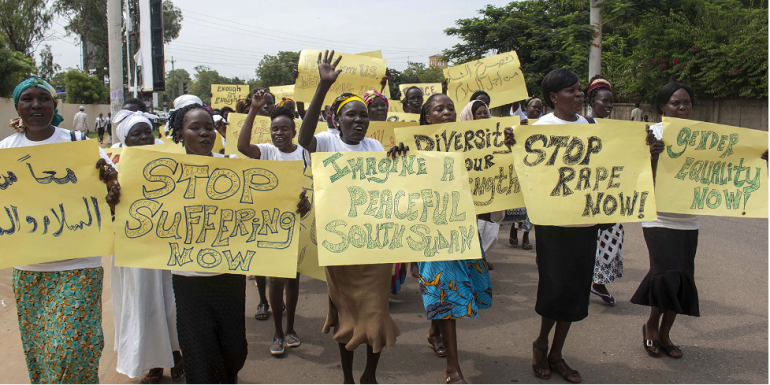By Manyuon Mayen Manyuon
Juba, (May 30, 2023) –In what seems to be an invisible community crisis, domestic violence has become one of the biggest contributors to psychological disorders and trauma among women and girls in South Sudan.
According to local reports, practicing lawyers at the South Sudan Bar Association admitted that most women have been suffering in silence and end up abandoning families over the subject. The cases include sexual assaults, namely intimate partner violence, rape, defilement, psychosocial violence and harassment.
In 2021 alone, the South Sudan health authorities said they responded to approximately 330 cases of rape, physical violence, intimate partner violence, and other gender-based violence (GBV)-related issues across the country. But the locals said the figure was not accurate as the entire country might not have been surveyed. In 2020 as well, the Ministry of Gender and the United Nations Population Fund (UNFPA) estimated that 6,295 incidents of gender-based violence were recorded between January and September.
The report also suggested that delays in reporting cases were among the prime challenges facing the disadvantaged groups, as they are intimidated to report on the occurrence.
In April this year, authorities in Tonj East County of Warrap State arrested a man for gouging out his daughter’s eyes over marriage refusal-a sad story that generated social media debate for days, with many netizens questioning authorities’ reluctance to address the horrible practice.
Reliable information revealed that the 18-year-old daughter had refused to marry a man over the need to further her education dream-a career his father couldn’t hold onto because he had already arranged her for a wealthy man in his village.
On a related note, a young woman in her early 20s who chose to be identified as Mary due to safety reasons confessed in May this year that she had to escape the family house over intimidation to marry a 45-year-old man after the first marriage attempt failed.
“It is quite horrible. I am being forced to marry a guy who is equivalent to my father’s age. I am devastated and affected,” she quipped.
“It is a terrible experience, and I am left in a dilemma. I only pray to God to reverse this situation. I am told that if they discover my whereabouts, I will get killed,” Mary revealed.
The lady in question is currently staying with a friend in an undisclosed location in South Sudan since she is at large.
Gai Makiew Gai, one of the civil society activists in Juba, admitted that cases of domestic violence were a serious alarm in the country.
“The cases of domestic violence are on the rise. Others are connected to the ongoing economic hardships and some disorganized families that do not prioritize women’s rights. This practice is quite messing up our people,” he explained.
Mr. Gai revealed that the occurrence has fragmented families and is furthering hatred among the families.
“The impact is so negative. It is tormenting families. You find women divorcing men and leaving kids in difficult situations. On the other hand, it has high health-related impacts. Women could end up being sexually harassed and exploited. This increases the rate of sexually transmitted diseases.”
Counsel Reech Malual, a Juba-based legal practitioner, said the occurrence is prohibited by the law.
“Legally, it is unlawful. Domestic violence cases are prohibited by the law, and they shouldn’t be allowed in our communities,” he explained.
While Counsel Malual admits that there is a huge gap in understanding the law, he calls on the communities to discourage the practice and set a proper gender responsive record.
“The law is very clear on gender-based violence issues. So, communities shouldn’t succumb to such practices. So, when those issues arise, they should always be presented before a court of law. The practice has to be discouraged and stopped,” Malual explained.
According to the South Sudan Transitional Constitution of 2011 as amended, domestic violence is prohibited by law. In a provision, Malual said, “the ministry of justice should have to lead the way so that it tries all the cases before the court of law. There’s no exception when it comes to domestic violence.”
Aya Benjamin Warile, the National Minister of Gender, Child, and Social Welfare, said the establishment of the gender-based violence court in Juba would handle some of the alarming cases, which continue at a high rate.
“It is part of our plan to develop initiatives and ways to reduce GBV and its negative impacts on the population in the country,”
However, since its establishment in 2020, the Gender GBV and Juvenile Court has sentenced more than 100 young men to different prison terms for committing various GBV crimes.
Gender-based violence (GBV) is a serious violation of human rights and a life-threatening health and protection issue, according to the United Nations High Commission for Refugees (UNHCR).
When people flee their homes, they are often at greater risk of physical, sexual, and psychological violence, such as rape, sexual abuse, trafficking, and forced prostitution, the refugee agency added. It is also estimated that one in three women will experience sexual or physical violence in their lifetime.











